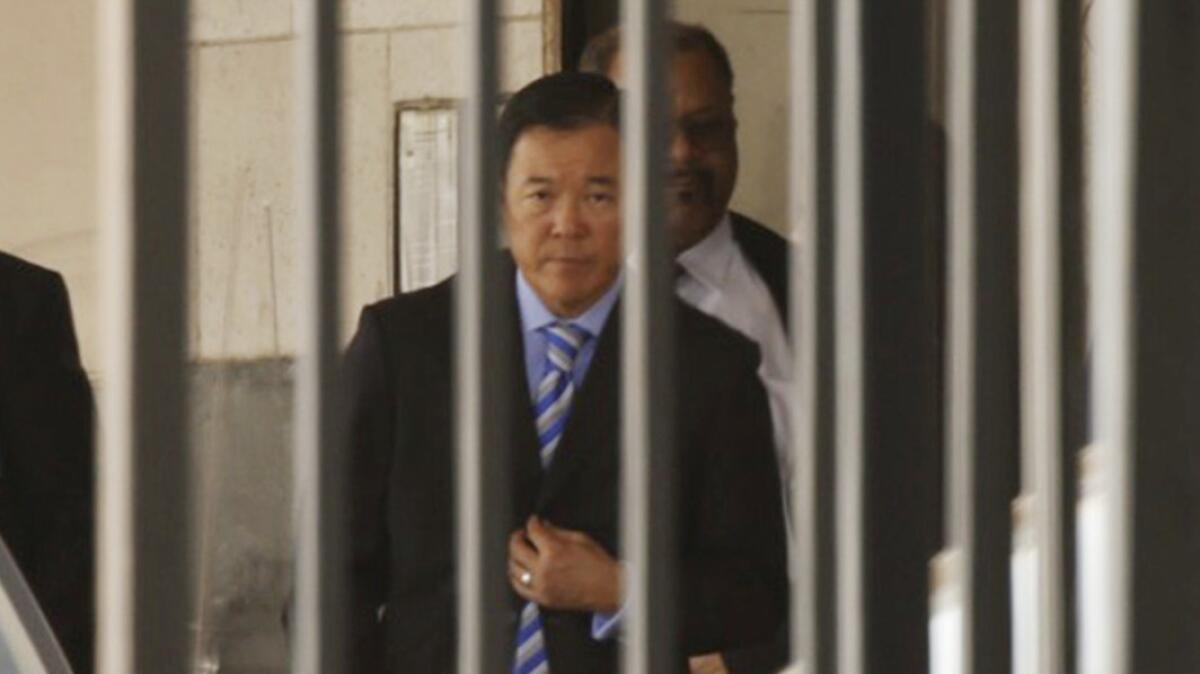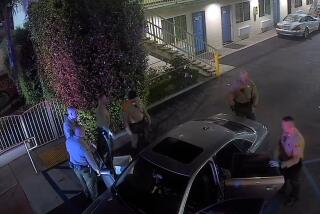Former top L.A. County sheriff’s official given 5-year sentence for obstructing FBI probe

For years, allegations of inmate beatings by sheriff’s deputies in Los Angeles County jails swirled. When they did, one name surfaced over and over: Paul Tanaka.
Tanaka, a Sheriff’s Department veteran who rose to become second in command of one of the county’s largest police agencies, was dogged by accusations that he gave deputies free reign to use violence as they saw fit and protected them from repercussions.
The diminutive but nonetheless imposing leader dismissed the claims as baseless grumblings from underlings who were unwilling to live up to his exacting standards or harbored jealousies about his success.
But on Monday, that self-portrait cracked and crumbled for good as a stone-faced Tanaka stood before a federal judge who excoriated the former undersheriff for his ethical failures before sentencing him to five years in prison.
Tanaka, 57, was convicted in April of conspiracy and obstructing an FBI investigation into deputy jail abuses. Prosecutors accused him of overseeing a scheme in which underlings tried to intimidate the lead FBI agent on the inquiry, concealed the whereabouts of an inmate who was working as a federal informant and pressured deputies not to cooperate with the investigation.

Speaking in a downtown courtroom packed with friends and foes of Tanaka, U.S. District Judge Percy Anderson sharply rejected the defiant stance Tanaka has maintained throughout the case that he was unfairly scapegoated and knew little of what was unfolding around him.
“Not only did he fail to identify and address problems in the jails, he exacerbated them,” the judge said of Tanaka.
The former undersheriff, who had continued to serve as mayor of Gardena, is one of 10 people who have been convicted or pleaded guilty in connection with the obstruction case. The group includes former Sheriff Lee Baca, who stepped down two years ago amid the growing scandal and earlier this year admitted to a charge that he lied to federal investigators.
In a deal he made with prosecutors, Baca would be sentenced to no more than six months in prison. Anderson must still approve the agreement and could opt for a longer prison term when he sentences Baca next month.
Tanaka’s lawyer seized on the agreement prosecutors made with the former sheriff, calling it in a court filing “a sweet-heart kiss of a deal” that underscored the disparity in how the two men were being treated. The defense attorney returned to the idea on Monday, arguing to the judge that it would be “simply unfair” to send Tanaka to prison for five years, while allowing Baca off with a light sentence.
The stiff punishment, which was several months over what was called for under federal sentencing guidelines, completed a remarkable fall for Tanaka – a tough, overbearing leader who ran the department’s day-to-day operations. A deeply polarizing figure in local law enforcement circles, Tanaka earned fierce loyalty from some followers but to many others became the unsettling face of a police agency run amok.
Tanaka elevated quickly through the upper ranks of the department under the supportive hand of Baca. His rise came despite the reputation he earned for an iron-fisted, insular leadership style and the controversies that stemmed from it.
On several occasions, he infamously encouraged rank-and-file deputies to work “right on the edge of the line” and in the “gray area” of policing – admonitions that were interpreted by some to be green lights for misconduct. And, over the years, Tanaka refused to disavow the Vikings, an unsanctioned group of hard-charging deputies at a sheriff’s station in Lynwood that was plagued by allegations of brutality and at which Tanaka was a sergeant in the late 1980s.
Tanaka defended the group as benign and downplayed his decision to keep a tattoo of the group’s insignia despite the county paying out $7.5 million to settle lawsuits claiming abuse by Viking members.
Once seen as Baca’s heir apparent, Tanaka never recovered from the hit his standing suffered in 2011, when news of an FBI investigation into widespread problems in the county jails became public. Despite calls to push him out, Baca initially stood by Tanaka, portraying him as a skilled and valuable bureaucrat.
Baca did end up sidelining Tanaka after a blue-ribbon panel that investigated the jails and found widespread abuse faulted the sheriff for allowing his undersheriff to operate without effective oversight. Tanaka, it found, “engaged in conduct that undermined supervision of aggressive deputies and promoted an environment of lax and untimely discipline of deputy misconduct.” The undersheriff ultimately resigned in 2013 and then mounted an unsuccessful campaign to replace Baca as sheriff.
Tanaka’s downfall began when deputies in the county’s main jail facility discovered an inmate working as an FBI informant.
Federal prosecutors said that behind the scenes, Tanaka directed sheriff’s officials to shuttle the inmate informant to another jail facility under fake names to prevent FBI agents from finding him. In addition, prosecutors alleged, Tanaka was part of a decision to send sheriff’s sergeants to the home of the lead FBI agent on the investigation, where they threatened to arrest her for running a sting operation in which a cellphone was smuggled to the informant in jail.
Several jurors told The Times that they found Tanaka’s testimony at trial unconvincing and thought he was evasive.
Particularly damning were records of phone calls between Tanaka and key lower-ranking sheriff’s officials also implicated in the obstruction case. The records showed Baca frequently communicating with Tanaka, not the subordinates, as Tanaka claimed.
Calling Tanaka the “ringleader from the beginning” of the ploy to thwart the FBI investigation, Assistant U.S. Atty. Brandon Fox had urged Anderson to come down harshly.
Tanaka’s attorneys pushed back on the idea, suggesting he should get no prison time. In a memo to Anderson, and again in court Monday, they kept to the defiant stance they struck during the trial, claiming the true culprit was Baca, not Tanaka.
“The truth is that the crimes charged in this case were planned, directed and carried out by Leroy Baca, the former Sheriff for the County of Los Angeles,” attorney H. Dean Steward wrote in the memo. “None of this would have happened if Baca had simply cooperated with the FBI at the beginning.”
The attempt to blame Baca did not sway jurors at trial and got no traction Monday with Anderson. In giving Tanaka five years, the judge granted the request of prosecutors.
Tracing Tanaka’s ascent into the upper ranks of the Sheriff’s Department, Anderson sketched a portrait of a man with no moral compass and consumed by his own ambition. Even before the FBI had launched its investigation, the judge said Tanaka had “derailed efforts” by sheriff’s officials and outsiders to address the abuses in the jails and “perpetuated an environment of aggressive deputy conduct.”
With Tanaka standing before Anderson, his hands clasped in front of him, the judge addressed him directly.
“Your ambition and arrogance have been on display,” he said, adding that Tanaka’s testimony at his own trial and earlier ones was “evasive, combative and not credible.”
Anderson ended his comments on an unsettling note, saying Tanaka’s efforts to conceal the jail abuses from federal investigators had been largely successful. It was clear, Anderson said, that only a “small fraction” of deputies who mistreated inmates were identified and that many remain in the department.
The lower-ranking sheriff’s officials found guilty in the obstruction case remain free while appealing their convictions.
Tanaka was not taken into custody after Monday’s hearing and was ordered to surrender Aug. 1 to begin serving his sentence. His attorney said he would file a motion seeking to allow Tanaka to remain free pending an appeal of his conviction.
After the proceedings, Tanaka left through a loading dock exit and avoided a throng of reporters and television news cameras by ducking into a waiting Mercedes-Benz sedan with tinted windows.
ALSO
Charter school founder Steve Barr to challenge Garcetti in 2017
Deadly fire in Kern County burns 70 square miles, is 40% contained
Ex-L.A. County Sheriff Lee Baca has Alzheimer’s disease, but he still faces a 6-month prison term
UPDATES:
7:32 p.m.: This story was updated with some minor rewriting.
6:32 p.m.: This story was rewritten.
2:53 p.m.: This story was updated with more details from the sentencing hearing.
9:55 a.m.: This story was updated with details about the sentence.
This story was first published at 6 a.m.
More to Read
Start your day right
Sign up for Essential California for news, features and recommendations from the L.A. Times and beyond in your inbox six days a week.
You may occasionally receive promotional content from the Los Angeles Times.







